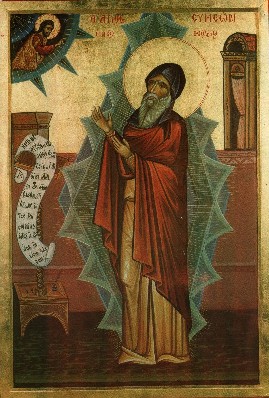
Symeon the New Theologian
Symeon the New Theologian (Greek: Συμεὼν ὁ Νέος Θεολόγος; 949–1022) was an Eastern Orthodox monk and poet who was the last of three saints canonized by the Eastern Orthodox Church and given the title of "Theologian" (along with John the Apostle and Gregory of Nazianzus). "Theologian" was not applied to Symeon in the modern academic sense of theological study; the title was designed only to recognize someone who spoke from personal experience of the vision of God. One of his principal teachings was that humans could and should experience theoria (literally "contemplation," or direct experience of God).
Symeon
12 March 1022
Paloukiton, near Chrysopolis
Ethical Discourses
Symeon was born into the Byzantine nobility and given a traditional education. At age fourteen he met Symeon the Studite, a renowned monk of the Monastery of Stoudios in Constantinople, who convinced him to give his own life to prayer and asceticism under the elder Symeon's guidance. By the time he was thirty, Symeon the New Theologian became the abbot of the Monastery of Saint Mamas, a position he held for twenty-five years. He attracted many monks and clergy with his reputation for sanctity, though his teachings brought him into conflict with church authorities, who would eventually send him into exile. His most well known disciple was Nicetas Stethatos who wrote the Life of Symeon.
Symeon is recognized as the first Eastern Christian mystic to freely share his own mystical experiences. Some of his writings are included in the Philokalia, a collection of texts by early Christian mystics on contemplative prayer and hesychast teachings. Symeon wrote and spoke frequently about the importance of experiencing directly the grace of God, often talking about his own experiences of God as divine light. Another common subject in his writings was the need of putting oneself under the guidance of a spiritual father. The authority for many of his teachings derived from the traditions of the Desert Fathers, early Christian monks and ascetics. Symeon's writings include Hymns of Divine Love, Ethical Discourses, and The Catechetical Discourses.
Biography[edit]
Early life[edit]
The details of Symeon's life come from his own writings and from the Life of Symeon, written by his disciple Nicetas. He was born at Basileion in Galatia to Basil and Theophano Galaton, members of the Byzantine nobility who supported the Macedonian dynasty. His given name at birth is unclear—it was traditional at that time, when becoming a monk, to take on a new name with the same initial as one's birth name. Symeon may have ignored that tradition in order to take the same name as his spiritual father, Symeon the Studite. In his writings, he sometimes described the experiences of "George," which might have been his birth name.[2] Symeon received a basic Greek school education until the age of eleven, when an uncle recognized that he had potential for higher learning. The uncle helped Symeon to complete his secondary education at the court of the emperor Basil II and his brother Constantine VIII.[3]
At age fourteen he met Symeon the Studite (also called Symeon the Pious), a holy monk of the Monastery of Stoudios in Constantinople. That meeting convinced the younger Symeon to forgo higher education and take on Symeon the Studite as his spiritual father. At that time he began studying the life of prayer and asceticism under his guidance, with the desire to immediately enter the monastery. Symeon the Studite asked the young Symeon to wait before becoming a monk, so he spent the years until age twenty-seven serving in the household of a patrician, though according to some sources he served the emperor instead.[4]
Living a worldly life during the day, he reportedly spent his evenings in vigils and prayer, putting into practice the writings of two authors—Marcus Eremita and Diadochos of Photiki—that were given to him by his spiritual father.[4] It was during this time that Symeon had his first experience of God as divine light, as he described later in one of his Discourses (Disc. 22.2–4). He attributed the experience to the prayers of Symeon the Studite. In spite of the experience, the young Symeon confessed that he still fell into worldly ways of living.[5] Direct personal experience of God was to become one of Symeon's central teachings in his writings, and to the monks who followed him.[6]
English translations